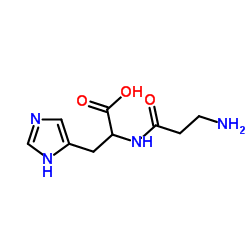Ribonuclease A

Ribonuclease A structure
|
Common Name | Ribonuclease A | ||
|---|---|---|---|---|
| CAS Number | 9001-99-4 | Molecular Weight | 226.232 | |
| Density | 1.4±0.1 g/cm3 | Boiling Point | 656.2±55.0 °C at 760 mmHg | |
| Molecular Formula | C9H14N4O3 | Melting Point | 243 ºC (dec.) | |
| MSDS | USA | Flash Point | 350.7±31.5 °C | |
| Symbol |

GHS07 |
Signal Word | Warning | |
|
2-Iodohexadecanal inhibits thyroid cell growth in part through the induction of let-7f microRNA.
Mol. Cell. Endocrinol. 414 , 224-32, (2015) It is well known that pituitary TSH exerts the major task in the regulation of thyroid function. However, this gland is capable of certain degree of autonomy, independently of TSH control. Iodine plays an important role in thyroid physiology and biochemistry.... |
|
|
Electrodynamic pressure modulation of protein stability in cosolvents.
Biochemistry 52(46) , 8363-73, (2013) Cosolvents affect structural stability of proteins in aqueous solutions. A clear understanding of the mechanism by which cosolvents impact protein stability is critical to understanding protein folding in a biological milieu. In this study, we investigated th... |
|
|
Striking stabilization of Rana catesbeiana ribonuclease 3 by guanidine hydrochloride.
FEBS Lett. 587(6) , 737-42, (2013) Unfolding by chemical denaturants and the linear extrapolation method are widely used to determine the free energy of proteins. Ribonuclease 3 from bullfrog shows an extraordinary behavior in guanidinium hydrochloride in comparison to its homologues ribonucle... |
|
|
Malignant transformation of host stromal fibroblasts derived from the bone marrow traced in a dual-color fluorescence xenograft tumor model.
Oncol. Rep. 34 , 2997-3006, (2015) Solid tumors are abnormal tissues containing tumor and non-tumor cells, also known as tumor stromal cells. However, the malignant potential of tumor stromal cells remains largely unknown. The aim of the present study was to investigate the malignant potential... |
|
|
Kaposi's sarcoma-associated herpesvirus-positive primary effusion lymphoma tumor formation in NOD/SCID mice is inhibited by neomycin and neamine blocking angiogenin's nuclear translocation.
J. Virol. 87(21) , 11806-20, (2013) Angiogenin (ANG) is a 14-kDa multifunctional proangiogenic secreted protein whose expression level correlates with the aggressiveness of several tumors. We observed increased ANG expression and secretion in endothelial cells during de novo infection with Kapo... |
|
|
The histone H2A deubiquitinase Usp16 regulates embryonic stem cell gene expression and lineage commitment.
Nat. Commun. 5 , 3818, (2014) Polycomb Repressive Complex 1 and histone H2A ubiquitination (ubH2A) contribute to embryonic stem cell (ESC) pluripotency by repressing lineage-specific gene expression. However, whether active deubiquitination co-regulates ubH2A levels in ESCs and during dif... |
|
|
Separation of monosaccharides hydrolyzed from glycoproteins without the need for derivatization.
Anal. Bioanal. Chem 407 , 5453-62, (2015) Chromatographic separation of monosaccharides hydrolyzed from glycoconjugates or complex, aggregate biomaterials, can be achieved by classic analytical methods without a need for derivatizing the monosaccharide subunits. A simple and sensitive method is prese... |
|
|
Site-selective azide incorporation into endogenous RNase A via a "chemistry" approach.
Org. Biomol. Chem. 11(2) , 353-61, (2013) Site-selective labeling of endogenous proteins represents a major challenge in chemical biology, mainly due to the absence of unique reactive groups that can be addressed selectively. Recently, we have shown that surface-exposed lysine residues of two endogen... |
|
|
3,4 dihydroxyphenyl ethanol reduces secretion of angiogenin in human retinal pigment epithelial cells.
Br. J. Ophthalmol. 97(3) , 371-4, (2013) Age-related macular degeneration (AMD) is currently the leading cause of blindness in developed countries. Bevacizumab is a widely used anti-VEGF agent that is a commonly applied therapy for neovascular AMD; however, a consequence of bevacizumab therapy may b... |
|
|
Genome-wide identification and quantitative analysis of cleaved tRNA fragments induced by cellular stress.
J. Biol. Chem. 287(51) , 42708-25, (2012) Certain stress conditions can induce cleavage of tRNAs around the anticodon loop via the use of the ribonuclease angiogenin. The cellular factors that regulate tRNA cleavage are not well known. In this study we used normal and eIF2α phosphorylation-deficient ... |